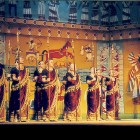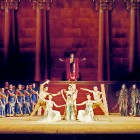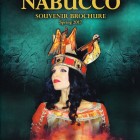Nabucco 2017Ellen Kent Productions
Read more about the opera Nabucco
The 2017 tour
The spring 2017 tour by the Ellen Kent organization, presented by Opera and Ballet International, as usual consisted of three works. The repertoire was generally popular, with mainstream Puccini (La bohème) and Verdi (Aïda) both seen frequently in the past. The one rarity, doubly welcome as it has never yet been presented either by the Edinburgh Festival or Scottish Opera, was Verdi's first masterpiece, Nabucco.
Edinburgh Playhouse saw all three, while Dundee, which will not be seeing Scottish Opera's new Bohème staging in May, just hosted the Puccini. Glasgow received the two most popular works.
The schedule for the Scottish week was: Mon 27 Mar Glasgow Bohème; Tue 28 Mar Glasgow Aïda; Thu 30 Mar Edinburgh Bohème; Fri 31 Mar Edinburgh Nabucco; Sat 1 Apr Edinburgh Aïda; Sun 2 Apr Dundee Bohème. The OperaScotland reviewers attended the last three of these.
The staging and performance
This single performance was, arguably, the most important of the week, as Nabucco is the only 'non-standard repertoire' work that the Ellen Kent team now presents, and in Scotland it really is quite a rarity. The staging was now directed by Ellen Kent herself. No designers were credited, but the set was an effective adaptation of the massive, multi-purpose amphitheatre introduced a few seasons ago. It was dominated by a central archway and staircase, providing focus, and there was plenty of space. It also appeared to provide the benefit of an acoustic shell to help voices project. The handsome costumes seemed, at least for the most part, survivors from the previous stagings.
The performance, while not perfect, was extremely enjoyable, giving an excellent idea of the work. It is not a subtle opera, but it is filled with many immediately attractive highlights. A change in policy this season saw the introduction of a team of unnamed young choristers. The cast list simply says 'Special thanks to.....the additional extras and UK opera singers who have joined us for this performance.' Sixteen singers plus a couple of extras all seemed to move and stand more naturally on stage than their predecessors, and they projected an excellent body of sound in the massed choruses, including a refined rendition of 'Va, pensiero'. Vasyl Vasylenko has been touring for several seasons now, and was an effectively dramatic conductor.
In the title role, Iuri Gisca revealed an excellent Verdian baritone. He is something of a company veteran (singing the High Priest a dozen years ago) and has developed well to tackle the bigger roles. Perhaps he didn't make quite enough of the character's madness, but he can dominate the stage - and coped well with the introduction of a horse for him to ride briefly.
Abigaille is a beast of a part that challenges any soprano with its series of leaps and runs between the high and low extremes of the range. She is also first of a group of very nasty Verdian lead soprano parts - Odabella in Attila and Lady Macbeth being clear successors as characters. Olga Perrier found some of the vocal hurdles a bit too much, but still made an effective impression in the part. Perhaps she should emphasise a few of her words - describing Nabucco as 'Insano!' was far more mild-mannered than it should be.
Zarui Vardanean is also a regular who has sung Fenena before, and has a warm lyrical mezzo that suits the part well. The tenor, Giorgio Meladze, has a lovely oaky dark-toned, near-heroic, voice and looks well on stage, while the new principal bass, Vadym Chernihovskiy, also has a beautifully-schooled voice and stage presence. These two make very welcome additions to the company.
Performance Cast
- Abigaille a slave, supposed elder daughter of Nabucco
- Fenena daughter of Nebuchadnezzar
- Ismaele nephew of Zedekiah, King of Jerusalem
- Nabucco Nebuchadnezzar, King of Babylon
- Zaccaria High Priest of the Hebrews
- High Priest of Baal
- Abdallo an elderly officer in the King of Babylon's service
- Anna Zaccaria's sister







